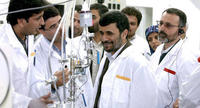-
Terror plot a "wake-up call" -- but experts differ on lessons to be drawn
Experts debate the significance of the terror attempt on Flight 253 last Christmas; Bruce Hoffman, a terrorism expert at Georgetown University, called it a “daring” plan that was “as close to an aviation disaster as we’ve been since 9/11”; to Hoffman, Flight 253 was a “wake-up call”; Bruce Schneier, who is a critic of many of the security measures initiated by DHS, says the real lesson of Flight 253 is that “Two things have made us safer since 9/11: reinforcing cockpit doors and convincing passengers they can fight back”; Schneier says technology is not the answer: “We can’t continue to let terrorists spend $4,000 to change their tactics and we spend $100 million in airport security in response. That’s not sustainable”
-
-
Representative Peter King, incoming Homeland Security Committee chairman
Representative Peter King (R-New York), the incoming chairman of the House Homeland Security Committee, was interviewed by Homeland Security NewsWire’s editor-in-chief, Ben Frankel; King’s top three priorities as chairman: examine radicalization in the U.S. Muslim community; air cargo security; and measures to prevent the detonation of dirty bombs in American cities
-
-
King announces 112th Congress' Homeland Security subcommittees, chairmen
Representative Peter T. King (R-New York), chairman-elect of the House Committee on Homeland Security, announced Monday the homeland security subcommittees for the 112th Congress and his appointments of subcommittee chairmen
-
-
Geologists develop way to monitor covert nuclear tests in the Middle East
Not only is it difficult to identify exactly where an explosion takes place, but it is especially challenging to differentiate the seismic waves generated by nuclear explosions from those generated by earthquakes, volcanic activity, and mine collapses; geologists develop improved seismic model for monitoring nuclear explosions in Middle East
-
-
Software enables swifter justice
A system from the Eagan, Minnesota, company Intertech speeds the process of filing criminal complaints, eliminating steps that used to require paper; this summer, it received approval for its eCharging Web-based system, which cuts down on the time to process the complaints because officials sign off electronically through a password or fingerprint reader
-
-
U.S. anxious over terror attacks during holidays

Counterterrorism officials are tracking threats to the United States and Europe from al Qaeda and affiliated groups during the holiday season; the FBI and DHS have alerted state and local law enforcers to be wary of suspicious behavior and to change security measures regularly to interfere with any terrorist plans; the warning was sent in a bulletin Wednesday; there is specific intelligence of other attacks being planned against Europe during the holiday season, according to U.S. officials say
-
-
Experts: Iran's threat to kill U.S. generals is serious

Iran’s anger at the massive blow the Stuxnet malware has inflicted on its nuclear weapons program boils over; the commander of Iran’s Revolutionary Guard, Gen. Mohammad Reza Naghdi, threatened that American generals will be targeted and killed in revenge for last week’s attacks on two of Iran’s leading nuclear scientists; Iran and Middle East experts say that Iran often makes outlandish threats, but that this one has to be taken as a serious and credible threat because it came directly from Naghdi; the most likely place for an attack to occur would be Iraq, and any attack would most likely be carried out by surrogates working for the Iranian Revolutionary Guard; Bahrain, Qatar, and other Gulf states would also allow the Iranian general to carry out the threat
-
-
Stuxnet virus set back Iran's nuclear weapons program by two years: Langner
Ralph Langner, top German computer security expert and the leading authority on Stuxnet, says Stuxnet was as effective in disrupting Iran’s nuclear weapons program as a direct military strike — but without any fatalities; the malware has set back the Iranian program by two years; expert says the Israeli military was the likely creator of the virus
-
-
ASIS International, BSI release Business Continuity Management ANSI standard
ASIS International, BSI have released Joint Business Continuity Management ANSI Standard; the standard provides auditable criteria with accompanying guidance for developing and implementing a business continuity management system that improves an organization’s ability to prepare for, respond to, and recover from a disruptive event
-
-
U.K. prepares for pro-WikiLeaks attacks on government Web sites

Britain’s national security adviser has warned that government Web sites are at risk of cyber attack from pro-WikiLeaks hackers; the office of Prime Minister David Cameron said security adviser Peter Ricketts has raised his concerns before an extradition hearing scheduled for today (Tuesday), when WikiLeaks founder Julian Assange is to appear at a London court; Cameron’s spokesman Steve Field said the government’s priority is Web sites dealing with information that belongs to members of the public; he said the government has particular concerns about Web sites used to file tax returns or to claim benefits, which store sensitive personal information
-
-
WikiLeaks's Assange to be indicted for spying "soon"

If charges against Assange are brought, it would reflect a watershed event in the United States, which has never successfully prosecuted a news organization for publishing classified information; a report released last week by the Congressional Research Service acknowledged that federal prosecutors would have a hard time making charges stick against the whistle-blower Web site, which operates almost entirely abroad; “There may be First Amendment implications that would make such a prosecution difficult, not to mention political ramifications based on concerns about government censorship,” the report states, adding that additional difficulties would arise from the fact “that the investigation implicates —- foreign nationals whose conduct occurred entirely overseas”
-
-
Lawmakers urge Obama to expand State Department's cybercrime reach
Lawmakers call President Obama to expand the U.S. State Department’s foreign policy mechanisms to address crime and security on the Internet; Senator Kirsten Gillibrand (D-New York) joined with Senator Orrin Hatch (R-Utah) to author the International Cybercrime Reporting and Cooperation Act; this bill will hold foreign countries accountable for cybercrime committed on their soil
-
-
Senate bill would require minimum cybersecurity standards for Internet
Senator Benjamin Cardin (D-Maryland) has introduced a bill that would require the U.S. government to work with the private sector to propose minimum standards for internet and cybersecurity safety; “Just as automobiles cannot be sold or operated on public highways without meeting certain minimum safety standards, we also need minimum Internet and cybersecurity safety standards for our information superhighway,” Cardin said
-
-
Aussie intelligence chiefs fear nuclear war between Israel and Iran
WikiLeaks documents show that Australian intelligence agencies fear that Israel might launch military strikes against Iran and that Tehran’s pursuit of nuclear capabilities could draw the United States and Australia into a potential nuclear war in the Middle East; Australia’s top intelligence agency also says that Iran’s nuclear program is intended to deter attack and that it is a mistake to regard Iran as a “‘rogue state”
-
-
Experts: Stuxnet worm wreaks havoc at Iran's nuclear sites

Iran’s nuclear program is still in chaos as a result of the Stuxnet attack; the American and European experts say their security Web sites, which deal with the computer worm known as Stuxnet, continue to be swamped with traffic from Tehran and other places in the Islamic Republic, an indication that the worm continues to infect the computers at Iran’s two nuclear sites; Stuxnet was designed to take over the control systems and evade detection, and it apparently was very successful; last week President Mahmoud Ahmadinejad, after months of denials, admitted that the worm had penetrated Iran’s nuclear sites, but he said it was detected and controlled; the second part of that claim, experts say, does not ring true
-
More headlines
The long view
Factories First: Winning the Drone War Before It Starts
Wars are won by factories before they are won on the battlefield,Martin C. Feldmann writes, noting that the United States lacks the manufacturing depth for the coming drone age. Rectifying this situation “will take far more than procurement tweaks,” Feldmann writes. “It demands a national-level, wartime-scale industrial mobilization.”
No Nation Is an Island: The Dangers of Modern U.S. Isolationism
The resurgence of isolationist sentiment in American politics is understandable but misguided. While the desire to refocus on domestic renewal is justified, retreating from the world will not bring the security, prosperity, or sovereignty that its proponents promise. On the contrary, it invites instability, diminishes U.S. influence, and erodes the democratic order the U.S. helped forge.
Fragmented by Design: USAID’s Dismantling and the Future of American Foreign Aid
The Trump administration launched an aggressive restructuring of U.S. foreign aid, effectively dismantling the United States Agency for International Development (USAID). The humanitarian and geopolitical fallout of the demise of USAID includes shuttered clinics, destroyed food aid, and China’s growing influence in the global south. This new era of American soft power will determine how, and whether, the U.S. continues to lead in global development.
Water Wars: A Historic Agreement Between Mexico and US Is Ramping Up Border Tension
As climate change drives rising temperatures and changes in rainfall, Mexico and the US are in the middle of a conflict over water, putting an additional strain on their relationship. Partly due to constant droughts, Mexico has struggled to maintain its water deliveries for much of the last 25 years, deliveries to which it is obligated by a 1944 water-sharing agreement between the two countries.
How Disastrous Was the Trump-Putin Meeting?
In Alaska, Trump got played by Putin. Therefore, Steven Pifer writes, the European leaders and Zelensky have to “diplomatically offer suggestions to walk Trump back from a position that he does not appear to understand would be bad for Ukraine, bad for Europe, and bad for American interests. And they have to do so without setting off an explosion that could disrupt U.S.-Ukrainian and U.S.-European relations—all to the delight of Putin and the Kremlin.”
How Male Grievance Fuels Radicalization and Extremist Violence
Social extremism is evolving in reach and form. While traditional racial supremacy ideologies remain, contemporary movements are now often fueled by something more personal and emotionally resonant: male grievance.
